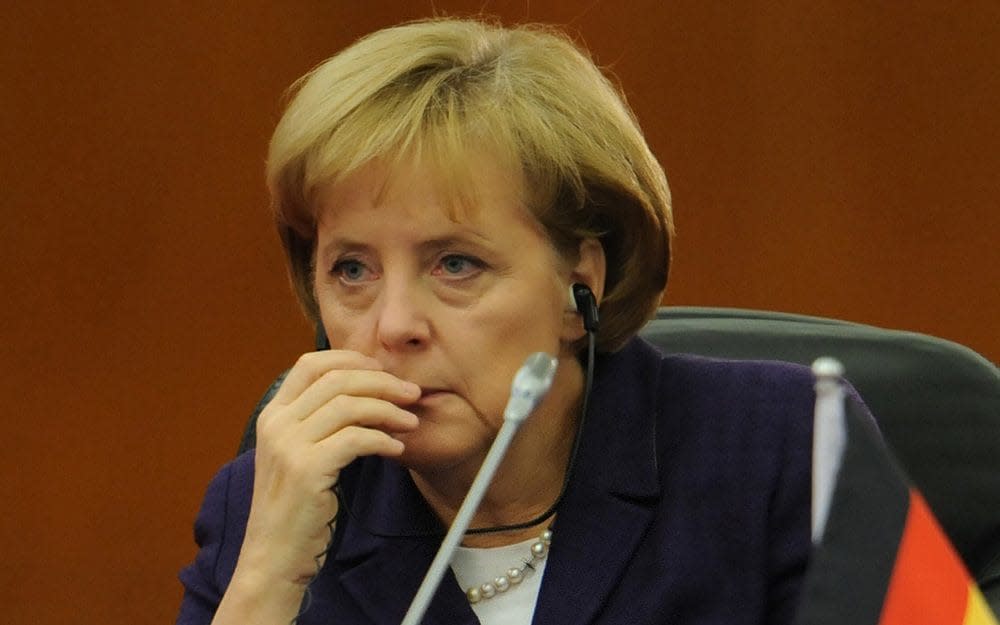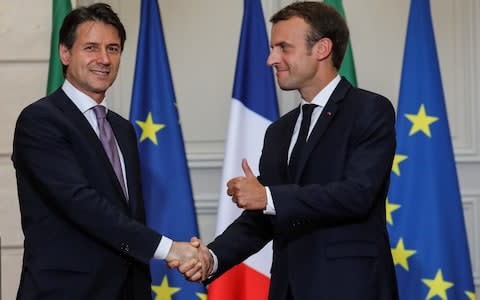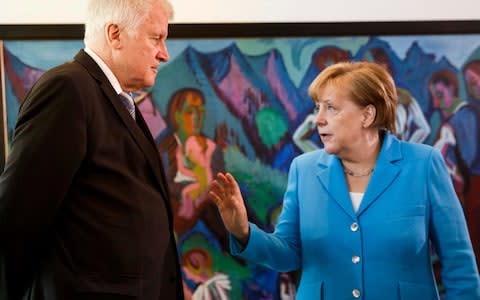Angela Merkel facing battle to save her coalition as immigration row splits Europe

Angela Merkel, the German chancellor, is to hold last-ditch talks to save her coalition government this weekend amid a major European rift over migrant policy.
The German chancellor is facing open rebellion from her interior minister, Horst Seehofer, over his plans to turn away migrants at the German border. Mrs Merkel has blocked the measure but Mr Seehofer is threatening to impose it unilaterally if he doesn’t win agreement by Monday - essentially daring the chancellor to sack him.
As leader of her Bavarian sister party, the Christian Social Union (CSU), Mr Seehofer could pull it out of Mrs Merkel’s coalition if he is fired, depriving her of a majority in parliament.
With both sides refusing to back down, German political commentators on Friday warned that the stand-off could potentially bring down the government, and even mean the end of Mrs Merkel’s term as chancellor.
On Friday, French president Emmanuel Macron came out in support of Mrs Merkel. "Countries are committed to the paths taken by their heads of state or government," the French president said, speaking at a press conference in Paris alongside Italian Prime Minister Giuseppe Conte.
Mr Macron also spoke out against the proposed hardline "axis" on migration formed this week by the interior ministers of Italy, Germany and Austria.

“I don't trust these catchphrases which did not bring us luck in the course of history," he said.
But the French president was at also pains to put on a united front with the leader of Italy's new populist government, after a week in which he had clashed over their hardline on immigration
Mr Macron and Mr Conte called for the European Union to set up asylum processing centres in African nations which have seen an exodus towards Europe in recent years.
The Aquarius, the ship carrying more then 600 migrants that sparked the row between the two after Italy refused it permission to dock, is now on its way to the Spanish port of Valencia.
In Germany, Wolfgang Schäuble, the speaker of parliament and Mrs Merkel’s former finance minister, is to mediate at talks this weekend in an attempt to find a compromise.
“The end of Merkel’s chancellorship has never been so close,” Süddeutsche Zeitung newspaper said in an editorial. Mrs Merkel’s 2015 decision to throw open Germany’s borders to migrants has suddenly and dramatically come back to haunt her.
At the heart of the dispute are Mr Seehofer’s plans to turn away migrants who have already registered in another European Union country at Germany’s borders.
Under the EU’s Dublin rules, Germany can return migrants to the first EU member state they enter, but only after they apply for asylum in Germany, a time-consuming and expensive process.
Mrs Merkel has so far blocked the proposals, arguing it could fatally undermine her efforts to agree a new EU-wide migrant policy at the next European summit in two weeks.

But her opponents say she is more concerned at being seen to close the borders now after keeping them open during the influx of 2015.
Mr Seehofer says Germany needs a solution to the migrant issue now and cannot wait.
But his critics say he is more concerned with grandstanding ahead of Bavarian elections in October, and fending off a challenge from the nationalist Alternative for Germany party (AfD), which has campaigned on an anti-migrant platform.
The issue is complicated by the German political system. Individual ministers have considerable autonomy in their own departments, which means Mrs Merkel can only block Mr Seehofer from introducing the plans by sacking him. That has left the two sides facing off in a dangerous game of brinkmanship in which both have plenty to lose.
In a development that could prove decisive, Mrs Merkel reportedly won the backing of her party’s MPs at a meeting behind closed doors on Thursday.
Mrs Merkel has also won the backing of her main coalition partner, the Social Democrats (SPD), who have denounced Mr Seehofer’s plan.
Carsten Schneider, the SPD chief whip, warned that the proposals to turn away migrants at the border could lead to the “end of the European Union”, while Anke Rehlinger, another SPD politician, said it would mean the return of heavily armed border troops and “the end of free Europe as we know it”.
But the CSU has rallied as strongly behind Mr Seehofer.
“We don’t want to risk losing credibility,” Markus Söder, the regional prime minister of Bavaria and Mr Seehofer’s chief rival within the party said.
And sources within the party told the German press on Friday they were ready to go with the “nuclear option” if Mrs Merkel doesn’t back down.

